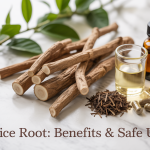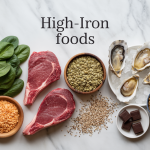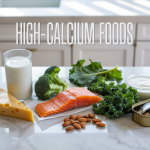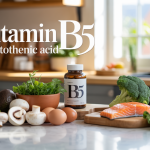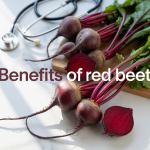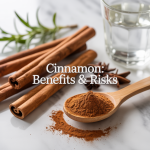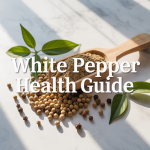Vitamin C is one of the most important nutrients your body needs to stay healthy and function properly. This guide is perfect for health-conscious individuals, busy professionals, and anyone wanting to boost their immune system naturally through better nutrition.
You’ll discover how vitamin C actually works in your body and why it’s so critical for everything from wound healing to fighting off infections. We’ll also walk through the telltale signs that you might not be getting enough vitamin C in your diet, plus share the top food sources that pack the biggest nutritional punch. Finally, you’ll learn exactly how much vitamin C you need each day and avoid the common mistakes that can sabotage your efforts to get the most from this powerhouse nutrient.
Understanding Vitamin C’s Essential Role in Your Body
Boost Your Immune System Defense Naturally
Vitamin C acts as your body’s personal security guard, strengthening your immune system’s ability to fight off infections and diseases. When you consume adequate amounts of this essential nutrient, your white blood cells become more effective at identifying and destroying harmful pathogens. These immune cells rely heavily on vitamin C to function properly, and they actually concentrate this vitamin at levels up to 80 times higher than found in your blood plasma.
Your body uses vitamin C to produce interferons, which are proteins that help your immune system communicate and coordinate its response to threats. This nutrient also supports the production of antibodies, the specialized proteins that remember and neutralize specific invaders. During times of illness or stress, your immune cells rapidly deplete their vitamin C stores, making regular replenishment crucial for maintaining strong defenses.
Enhance Collagen Production for Healthier Skin
Collagen serves as the scaffolding that keeps your skin firm, elastic, and youthful-looking. Vitamin C plays an indispensable role in collagen synthesis by acting as a cofactor for the enzymes that build these structural proteins. Without sufficient vitamin C, your body simply cannot produce quality collagen, leading to weakened skin structure and accelerated aging signs.
The process works at the cellular level, where vitamin C helps convert amino acids into stable collagen fibers. These fibers form the foundation that supports your skin’s texture and appearance. Regular vitamin C intake helps maintain skin elasticity, reduces fine lines, and promotes faster wound healing. Your skin cells also use this vitamin to repair damage from environmental stressors like UV radiation and pollution.
Improve Iron Absorption for Better Energy
Iron deficiency affects millions of people worldwide, often leading to fatigue, weakness, and reduced cognitive function. Vitamin C significantly enhances your body’s ability to absorb iron from plant-based foods by converting iron from its poorly absorbed form (ferric) into its easily absorbed form (ferrous). This conversion process can increase iron absorption by up to 300%.
When you pair vitamin C-rich foods with iron sources, you create a powerful combination that maximizes nutrient uptake. For example, adding lemon juice to spinach or eating strawberries with fortified cereals dramatically improves iron absorption. This partnership becomes especially important for vegetarians, vegans, and anyone at risk of iron deficiency anemia.
Protect Cells from Oxidative Damage
Your cells face constant attack from free radicals, unstable molecules that damage cellular components and accelerate aging. Vitamin C functions as a potent antioxidant, neutralizing these harmful free radicals before they can cause significant damage to your DNA, proteins, and cell membranes. This protective action helps prevent chronic diseases and supports healthy aging.
The antioxidant properties of vitamin C extend beyond simple free radical scavenging. This nutrient also helps regenerate other important antioxidants like vitamin E, creating a network of cellular protection. Your body’s antioxidant defense system relies on vitamin C to maintain the delicate balance between free radical production and neutralization, keeping your cells healthy and functioning optimally.
Recognizing Vitamin C Deficiency Signs and Symptoms
Identify Early Warning Signs Before They Worsen
Your body sends clear signals when vitamin C levels drop too low, but these warning signs often get dismissed as everyday tiredness or stress. The most common early indicator is persistent fatigue that doesn’t improve with rest. You might notice your energy levels plummeting even after a full night’s sleep, making simple daily tasks feel overwhelming.
Frequent infections are another red flag. If you’re catching every cold that goes around the office or dealing with cuts and scrapes that take forever to heal, your immune system might be struggling due to insufficient vitamin C. Your skin becomes your body’s billboard for deficiency – watch for unusual bruising from minor bumps, small red spots around hair follicles, or wounds that seem stuck in slow-motion healing mode.
Gum problems often appear before other symptoms become severe. Swollen, bleeding gums during brushing or flossing signal that your connective tissues aren’t getting enough vitamin C support. Joint pain and muscle aches can also creep in, particularly in your legs and back.
Mental symptoms deserve attention too. Irritability, depression, and difficulty concentrating frequently accompany vitamin C deficiency. Many people brush these off as work stress or life pressures, but they could indicate your brain isn’t getting the antioxidant protection it needs.
Understand Long-term Health Consequences
Ignoring vitamin C deficiency leads to progressively serious health problems that can permanently damage your quality of life. Scurvy represents the extreme end of deficiency, but you don’t need to reach that point to experience significant health impacts.
Your cardiovascular system bears a heavy burden when vitamin C remains low for extended periods. Blood vessels lose their structural integrity, leading to increased risk of heart disease and stroke. Iron absorption becomes severely impaired, creating a domino effect that results in anemia and compounded fatigue.
Bone health deteriorates as collagen production falters. Without adequate vitamin C, your body can’t maintain the protein matrix that keeps bones strong and flexible. This sets the stage for increased fracture risk and poor bone density as you age.
Chronic wound healing problems become a dangerous reality. Small injuries that should heal within days can linger for weeks or months, creating opportunities for serious infections. Your skin loses its elasticity and repair mechanisms, leading to premature aging and increased scarring.
The immune system undergoes progressive weakening, making you vulnerable to more frequent and severe infections. White blood cell function becomes compromised, reducing your body’s ability to fight off bacteria, viruses, and other pathogens.
Assess Your Personal Risk Factors
Certain lifestyle factors and health conditions dramatically increase your chances of developing vitamin C deficiency. Smoking tops the list of risk factors because it destroys vitamin C in your bloodstream faster than your body can replace it. Smokers need nearly double the vitamin C intake of non-smokers just to maintain basic levels.
Age plays a significant role in deficiency risk. Adults over 65 often struggle with adequate vitamin C intake due to reduced appetite, medication interactions, or difficulty preparing fresh foods. Pregnancy and breastfeeding also increase vitamin C requirements substantially.
Your diet patterns reveal crucial risk information. If you rarely eat fresh fruits and vegetables, rely heavily on processed foods, or follow restrictive eating plans, you’re setting yourself up for deficiency. People with food allergies or intolerances that limit fruit and vegetable choices face elevated risk.
Medical conditions can sabotage your vitamin C status even with adequate intake. Digestive disorders like Crohn’s disease or celiac disease interfere with nutrient absorption. Kidney disease affects how your body processes and retains vitamin C. Cancer treatments often deplete vitamin C stores rapidly.
Geographic and seasonal factors matter more than most people realize. Limited access to fresh produce during winter months or living in areas with expensive, low-quality fruits and vegetables can create deficiency conditions. Stress, both physical and emotional, burns through vitamin C reserves quickly, making high-stress individuals particularly vulnerable to deficiency symptoms.
Discover the Best Natural Food Sources of Vitamin C
Maximize Intake with Citrus Fruits and Berries
Citrus fruits pack the biggest vitamin C punch, with oranges delivering about 70mg per medium fruit. Grapefruits come close behind at 65mg per half, while lemons and limes offer concentrated doses perfect for daily water or tea additions. Fresh orange juice provides roughly 124mg per cup, but whole fruits give you extra fiber benefits.
Berries deserve equal attention for their vitamin C content. Strawberries lead the pack with 89mg per cup, followed by kiwis at 164mg per cup – one of the highest concentrations you’ll find. Blackberries and raspberries offer solid amounts too, plus they’re loaded with antioxidants that work alongside vitamin C.
Guavas blow most fruits out of the water with an impressive 377mg per cup. Papayas provide 88mg per cup and contain enzymes that help your body absorb the vitamin more effectively. Cantaloupe and pineapple round out the tropical options with respectable vitamin C levels.
Unlock Hidden Sources in Vegetables and Herbs
Red bell peppers surprise many people by containing more vitamin C than oranges – about 190mg per cup. Yellow peppers aren’t far behind, and even green peppers provide substantial amounts. Raw peppers give you the most vitamin C since cooking breaks down some nutrients.
Cruciferous vegetables are vitamin C powerhouses often overlooked. Brussels sprouts contain 75mg per cup, while broccoli provides 81mg. Cauliflower offers 52mg per cup and pairs well with other vitamin C-rich foods. Raw cabbage beats cooked versions for maximum nutrient retention.
Leafy greens contribute meaningful amounts too. Kale provides 80mg per cup, spinach offers 8mg per cup raw, and parsley packs a concentrated 133mg per cup. Fresh herbs like cilantro and basil add vitamin C along with flavor to your meals.
Tomatoes provide 23mg per medium fruit, with cherry tomatoes being particularly convenient for snacking. Sweet potatoes offer 22mg per medium potato plus beta-carotene benefits.
Compare Vitamin C Content Across Different Foods
| Food Item | Serving Size | Vitamin C (mg) | % Daily Value |
|---|---|---|---|
| Guava | 1 cup | 377 | 419% |
| Red Bell Pepper | 1 cup | 190 | 211% |
| Kiwi | 1 cup | 164 | 182% |
| Papaya | 1 cup | 88 | 98% |
| Strawberries | 1 cup | 89 | 99% |
| Broccoli | 1 cup | 81 | 90% |
| Orange | 1 medium | 70 | 78% |
| Cantaloupe | 1 cup | 65 | 72% |
| Brussels Sprouts | 1 cup | 75 | 83% |
| Pineapple | 1 cup | 79 | 88% |
The recommended daily value sits at 90mg for men and 75mg for women, making it easy to meet needs through whole foods. Many fruits and vegetables exceed daily requirements in single servings.
Comparing fresh versus processed options reveals significant differences. Fresh strawberries contain 89mg per cup while frozen varieties retain most nutrients. Canned fruits lose substantial vitamin C during processing, dropping to 20-30% of fresh amounts.
Preserve Maximum Nutrients Through Proper Storage
Vitamin C breaks down quickly when exposed to light, air, and heat. Store fruits and vegetables in cool, dark places to maintain maximum potency. Refrigeration slows nutrient loss significantly compared to room temperature storage.
Cut fruits and vegetables lose vitamin C rapidly through exposed surfaces. Prepare these foods just before eating rather than pre-cutting for later use. When you must prep ahead, store cut produce in airtight containers with minimal air exposure.
Cooking methods dramatically affect vitamin C retention. Steam vegetables instead of boiling to preserve up to 50% more nutrients. Quick stir-frying works well too, keeping cooking times short. Microwaving actually preserves more vitamin C than conventional cooking methods.
Frozen fruits and vegetables often contain more vitamin C than fresh produce that’s traveled long distances or sat in storage. The freezing process happens at peak ripeness, locking in nutrients. Choose frozen options without added sugars or sauces for best results.
Buy smaller quantities more frequently rather than stocking up on large amounts. Vitamin C content drops daily in stored produce, so fresher always means more nutritious.
Optimize Your Daily Vitamin C Intake Requirements
Determine Your Individual Dosage Needs
Your vitamin C needs aren’t the same as everyone else’s. While the standard recommendation sits at 65-90 mg daily for adults, your personal requirements can vary dramatically based on several key factors.
Age plays a significant role in determining your optimal intake. Adults over 65 typically need higher amounts due to decreased absorption efficiency and increased oxidative stress. Pregnant women require 85 mg daily, while breastfeeding mothers need 120 mg to support both their health and their baby’s development.
Lifestyle factors dramatically impact your vitamin C requirements. Smokers need an additional 35 mg daily because tobacco use rapidly depletes vitamin C stores. Regular alcohol consumption also increases your needs, as alcohol interferes with vitamin C absorption and metabolism.
Your health status matters too. People with chronic conditions like diabetes, cardiovascular disease, or autoimmune disorders often benefit from higher intakes. Those recovering from surgery or illness may need 200-500 mg daily to support tissue repair and immune function.
Environmental stressors like pollution, extreme temperatures, or high-stress jobs can increase your requirements. Athletes and physically active individuals typically need 100-200 mg daily due to increased oxidative stress from exercise.
Consider starting with 100-200 mg daily if you’re healthy, then adjust based on your specific circumstances. Monitor how you feel and consult healthcare providers for personalized recommendations, especially if you have underlying health conditions.
Balance Food Sources with Supplements Effectively
Getting vitamin C from whole foods offers advantages that supplements can’t match. Foods provide vitamin C alongside bioflavonoids, fiber, and other nutrients that enhance absorption and effectiveness. A single orange contains not just vitamin C, but also hesperidin and other compounds that work together synergistically.
Start by maximizing your food intake before considering supplements. Aim for 2-3 servings of vitamin C-rich foods daily. One cup of strawberries provides 85 mg, while a medium orange delivers about 70 mg. Red bell peppers pack an impressive 190 mg per cup, making them one of the richest sources available.
| Food Source | Vitamin C Content (mg) | Additional Benefits |
|---|---|---|
| Red Bell Pepper (1 cup) | 190 | Beta-carotene, fiber |
| Kiwi (1 medium) | 92 | Fiber, potassium |
| Strawberries (1 cup) | 85 | Antioxidants, folate |
| Orange (1 medium) | 70 | Fiber, folate |
| Broccoli (1 cup) | 81 | Vitamin K, fiber |
Supplements become valuable when you can’t meet your needs through food alone. Choose high-quality supplements with third-party testing. Buffered vitamin C or calcium ascorbate causes less stomach irritation than regular ascorbic acid.
Don’t abandon food sources when taking supplements. The combination provides better overall nutrition and helps prevent the digestive upset that can come from high-dose supplements alone. Split your intake between morning food sources and afternoon supplements for steady levels throughout the day.
Time Your Intake for Maximum Absorption
Your body handles vitamin C best when you spread intake throughout the day rather than taking one large dose. Since vitamin C is water-soluble, your body can only absorb about 200 mg at once. Taking more than this amount at one time means you’ll literally flush the excess down the drain.
Morning represents an ideal time for your first dose. Your vitamin C levels are naturally lowest after fasting overnight, and starting your day with this nutrient supports your immune system and energy production. Pair it with breakfast to minimize any potential stomach irritation.
Spacing doses 4-6 hours apart optimizes absorption rates. If you’re taking 500 mg daily, divide it into 200 mg in the morning, 200 mg at lunch, and 100 mg in the evening. This approach maintains steady blood levels and maximizes the amount your body actually uses.
Avoid taking large doses right before bed. While vitamin C doesn’t directly interfere with sleep, some people find that high doses late in the day can cause mild digestive discomfort or frequent urination that disrupts rest.
Consider your meal timing when planning intake. Taking vitamin C with food improves absorption and reduces stomach upset, but iron-rich meals can enhance this effect even more. The combination helps your body absorb both nutrients more efficiently.
During illness or high stress, you can increase frequency rather than dose size. Taking 200 mg every 3-4 hours provides better tissue saturation than taking 1000 mg twice daily, giving your immune system more consistent support when it needs it most.
Avoid Common Vitamin C Mistakes That Reduce Benefits
Prevent Overconsumption and Potential Side Effects
Taking too much vitamin C can backfire on your health goals. The upper safe limit sits at 2,000 mg daily for adults, and exceeding this amount regularly can trigger uncomfortable digestive issues like diarrhea, nausea, and stomach cramps. Your body can only absorb so much vitamin C at once – around 200-400 mg per dose – so megadoses just get flushed out through your urine.
High doses can also increase your risk of kidney stones, especially if you’re already prone to them. Some people experience headaches, insomnia, or even skin flushing when they take excessive amounts. The “more is better” mindset doesn’t apply here – your body maintains tight control over vitamin C levels, and pushing beyond its capacity creates unnecessary stress.
Choose High-Quality Supplements Over Synthetic Options
Not all vitamin C supplements deliver the same benefits. Synthetic ascorbic acid, while chemically identical to natural vitamin C, lacks the supporting compounds found in whole food sources. These cofactors – including bioflavonoids, rutin, and hesperidin – help your body absorb and use vitamin C more effectively.
Look for supplements derived from natural sources like acerola cherry, camu camu, or rose hips. These provide vitamin C in its natural complex form, often with better bioavailability. Liposomal vitamin C represents another quality option, as it’s encapsulated in fat molecules that protect the nutrient during digestion and improve cellular uptake.
Check labels carefully – quality supplements list specific sources and avoid unnecessary fillers, artificial colors, and preservatives. Third-party testing certification adds another layer of quality assurance.
Store and Prepare Foods to Maintain Potency
Vitamin C breaks down easily when exposed to heat, light, air, and water. Your cooking and storage methods can dramatically impact how much vitamin C actually makes it to your plate. Steam or quickly stir-fry vegetables instead of boiling them to preserve more nutrients. When you boil vegetables, vitamin C leaches into the water and gets poured down the drain.
Store vitamin C-rich fruits and vegetables in cool, dark places, preferably in the refrigerator. Cut produce right before eating or cooking – the longer cut surfaces are exposed to air, the more vitamin C oxidizes and disappears. Frozen fruits and vegetables often contain more vitamin C than fresh produce that’s been sitting in stores for days.
Avoid storing cut citrus fruits in metal containers, as the acid can react with metal and degrade the vitamin content. Glass or plastic containers work better for maintaining potency.
Avoid Interactions with Medications and Other Nutrients
Vitamin C can interfere with certain medications and affect how your body processes other nutrients. High doses can increase iron absorption, which sounds good but can be problematic if you have conditions like hemochromatosis or take iron supplements regularly. This combination can lead to iron overload and related health issues.
Vitamin C can also reduce the effectiveness of blood-thinning medications like warfarin by interfering with clotting mechanisms. If you take chemotherapy drugs, large doses of antioxidants like vitamin C might reduce their effectiveness by protecting cancer cells from oxidative damage.
Some people experience reduced absorption of vitamin B12 when taking large vitamin C doses simultaneously. Space out these supplements by several hours if you take both. Additionally, vitamin C can give false readings on certain medical tests, including glucose tests for diabetics and tests for blood in stool samples.
Always inform your healthcare provider about vitamin C supplementation, especially if you take prescription medications or have underlying health conditions.
Vitamin C plays a crucial role in keeping your immune system strong, helping wounds heal faster, and protecting your cells from damage. The signs of deficiency are often subtle at first – fatigue, frequent colds, and slow healing cuts – but catching them early can make a big difference. Getting your vitamin C from whole foods like citrus fruits, bell peppers, and leafy greens gives you the best absorption and additional nutrients your body craves.
The key to maximizing vitamin C’s benefits lies in consistency and smart choices. Spread your intake throughout the day since your body can’t store this water-soluble vitamin for long. Skip the mega-doses that just end up flushed away, and remember that cooking methods matter – raw or lightly steamed foods preserve more vitamin C than heavily processed options. Start making small changes to include more vitamin C-rich foods in your daily meals, and your body will thank you with better energy, stronger immunity, and overall improved health.
